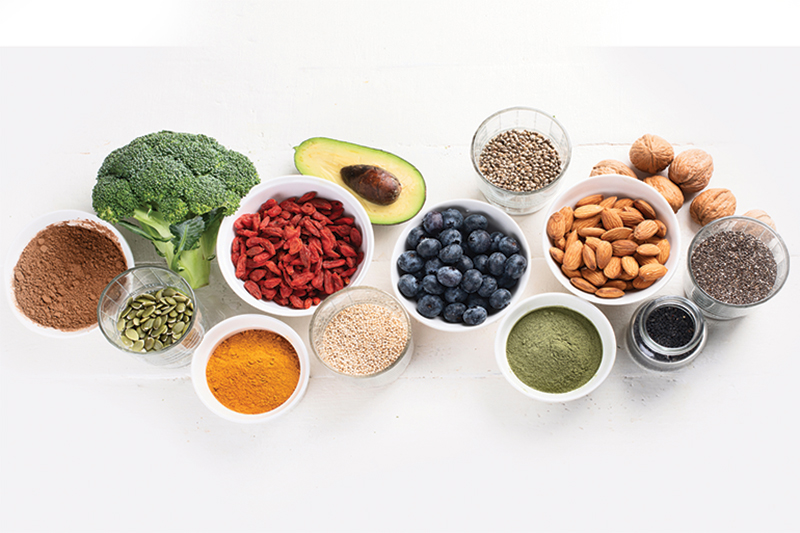You have more than likely heard the expression, “you are what you eat.” When considering your nutrition, you probably think about weight (as you should); however, eating an intentional, mindful, nutrient-dense diet should also be about prevention. With every meal, you’re either preventing disease or feeding it. In fact, one of the mightiest weapons in the fight against chronic illness and diseases such as breast cancer may just be the fork! Eating for whole-body health is first and foremost, but it is important to know that food can play a key role in reducing the risk of breast cancer. While science suggests a healthful, plant-based diet can decrease the risk of breast cancer by up to two-thirds, certain foods stand out among the others for better breast health.
Fill Your Plate with Breast-Healthy Foods
Here’s a breakdown of a few foods best for breast health:
- Spinach and other leafy greens such as kale, chard, arugula, etc., are incredibly rich in vitamins, minerals, enzymes, and antioxidants. They also serve as natural sources of glucosinolates, which studies show may work to inactivate carcinogens and help reprogram cancer cells to die off. Additionally, these greens are low in calories and sodium, two things you want to look out for when eating for breast health.
- Blueberries are considered a superfood because they’re high in disease-fighting antioxidants known as polyphenols, which may help destroy cancer cells while leaving healthy cells intact. When it comes to fruit, stick to mostly berries—they’re filled with antioxidants and they’re the lowest in sugar, which is an important factor in cancer prevention. Don’t just stop with blueberries, though—other excellent berry options include raspberries, strawberries, cherries, and goji berries.
- Broccoli and other cruciferous vegetables are high in sulforaphane, which may help reduce the spread and recurrence of breast cancer stem cells. Cruciferous vegetables also contain a phenol called indole-3-carbinol (I3C), which supports healthy estrogen metabolism and helps to maintain an optimal balance of estrogen(s). In addition to broccoli, other great choices are cauliflower, bok choy, cabbage, and Brussels sprouts.
- Walnuts are a superb food for breast health! They are known to have anti-inflammatory properties and are rich in amino acids and omega-3 fatty acids, along with alpha linolenic acid polyphenols, carotenoids, melatonin, and other antioxidants—twenty-three, in fact. Researchers agree that walnut-rich diets suppress the growth and development of breast tumors and may reduce the risk of breast cancer as well as colorectal cancer.
- Mushrooms also deserve a place of honor when it comes to reducing breast cancer risk. They have been shown to inhibit aromatase, an enzyme that produces estrogen. Since most breast cancer cells are sensitive to estrogen, daily consumption of mushrooms may help lessen the risk by reducing the amount of estrogen the breast tissue is exposed to. Very few foods are aromatase-inhibitors, making mushrooms a unique anticancer power food! Go ahead and add mushrooms—such as cremini, shiitake, oyster, portabella, and maitake—to the top of your grocery list.
- Avocados are rich in micronutrients, including vitamin C, vitamin E, vitamin B6, folate, and potassium, and are also high in fiber and packed with healthy fats. Research has shown since avocados are rich in phytochemicals, they may play an important role in the inhibition of cancer cell growth.
- Sweet potatoes are rich in antioxidants, including beta-carotene, which offers protection against free radical damage. An animal study found that compounds in sweet potato can have potential anti-tumor effects and may inhibit metastasis of breast cancer.
- Turmeric is considered one of the most powerful foods for breast health due to its active ingredient, curcumin. This compound has been found to decrease tumor size and fight breast cancer. According to research, curcumin modulates breast carcinogenesis through its effects on cell cycle and proliferation, apoptosis, senescence, cancer spread, and angiogenesis.
- Extra virgin olive oil, considered the mother of all oils, has antioxidant and anti-inflammatory compounds. Researchers believe that the consumption of olive oil as part of the Mediterranean diet contributes to its beneficial effects of cancer prevention.
Make the Right Choices
In addition to eating a nutritious diet full of foods that benefit breast health, there are other factors that are important for cancer prevention:
- Choose organic
- Opt for natural sweeteners vs. processed sugar
- Limit alcohol
- Avoid conventional dairy
- Reduce toxic exposure
- Exercise regularly
- Maintain a healthy weight
- Get 7–8 hours of sleep
Regular Screenings for Breast Health
While there is no food, exercise, or action plan that can guarantee pristine breast health and completely eradicate disease, there are ways to nudge the odds in your favor to help decrease the risk. One way to assess and monitor breast health is by using thermography as a regular screening method. This screening tool is an excellent way to track changes (good or bad) with breast health and empower your journey toward whole-body health. To learn more about thermography, visit our website: ctthermography.com.
April Beaman, RDH, CTT, is a medical thermographer certified by the Professional Academy of Clinical Thermology and a professional member of Breast Thermography International. Beaman has worked in the wellness industry for over 15 years and provides thermography screenings and wellness support for both men and women of all ages. She is the owner of CT Thermography located in Farmington, with satellite offices in Glastonbury, CT, and Hadley MA.
Connect at 860.415.1150 or CTThermography.com.
